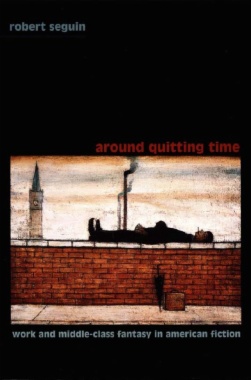Virtually since its inception, the United States has nurtured a dreamlike and often delirious image of itself as an essentially classless society. Given the stark levels of social inequality that have actually existed and that continue today, what sustains this at once hopelessly ideological and breathlessly utopian mirage? In Around Quitting Time Robert Seguin investigates this question, focusing on a series of modern writers who were acutely sensitive to the American web of ideology and utopic vision in order to argue that a pervasive middle-class imaginary is the key to the enigma of class in America.
Tracing connections between the reconstruction of the labor process and the aesthetic dilemmas of modernism, between the emergence of the modern state and the structure of narrative, Seguin analyzes the work of Nathanael West, Ernest Hemingway, Willa Cather, John Barth, and others. These fictional narratives serve to demonstrate for Seguin the pattern of social sites and cultural phenomenon that have emerged where work and leisure, production and consumption, and activity and passivity coincide. He reveals how, by creating pathways between these seemingly opposed domains, the middle-class imaginary at once captures and suspends the dynamics of social class and opens out onto a political and cultural terrain where class is both omnipresent and invisible.
Aroung Quitting Time will interest critics and historians of modern U.S. culture, literary scholars, and those who explore the interaction between economic and cultural forms.
- Contents
- Acknowledgments
- ONE Class, Middle Class, and the Modalities of Labor
- TWO The Burden of Toil: Sister Carrie as Urban Pastoral
- THREE Willa Cather and the Ambivalence of Hierarchy
- FOUR New Frontiers in Hollywood: Mobility and Desire in The Day of the Locust
- FIVE Into the 1950s: Fiction in the Age of Consensus
- POSTSCRIPT The Insistence of Class and the Framing of Culture in the American Scene
- Notes
- Bibliography
- Index

